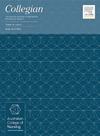直言气候对韩国护士发声与沉默的影响:以护士临床职业阶段为中心
IF 1.7
4区 医学
Q2 NURSING
引用次数: 0
摘要
患者安全是全球关注的问题,但医疗保健设置的复杂性经常导致通信失败。为了提高安全,促进护士直言不讳的行为已被考虑。目的确定护士在患者安全方面的直言相关行为,特别是关注护士的临床职业阶段,并调查影响其直言和沉默的因素。方法本横断面调查涉及韩国三家医院的359名医院护士,采用了直言患者安全问卷(SUPS-Q)。我们通过多元回归分析来探讨影响他们说话行为和沉默的因素。研究结果:临床经验不足一年的新护士比经验丰富的护士表现出更低的直言行为。几名护士经历了与开口有关的障碍,因为他们不确定在特定情况下的风险水平。少于3年临床经验的护士比经验丰富的护士更有可能经历不确定性。相比之下,具有五年以上临床经验的护士更多地报告了与说出来无效相关的障碍。心理安全对减少护士沉默有效,对增加护士发声无显著作用。鼓励环境在改善护士的建言行为方面发挥了至关重要的作用。讨论护士管理者和医院应支持和鼓励护士直言不讳的行为,以加强患者安全文化。为了解决职业障碍,需要实施针对职业的教育和培训。结论直言对患者安全至关重要;然而,护士经常不能充分表达他们对患者安全的担忧。这个问题在新手护士中尤其普遍,他们不愿意说出来。鼓励积极主动的文化使护士能够更有效地表达他们的关切。本文章由计算机程序翻译,如有差异,请以英文原文为准。
Impact of speaking-up climate on Korean nurses’ voice and silence: Focusing on nurses’ clinical career stages
Background
Patient safety is a global concern, but healthcare setting complexity frequently causes communication failures. To improve safety, promoting nurses’ speaking-up behaviour has been considered.
Aim
To identify nurses’ speaking-up-related behaviour regarding patient safety, particularly focusing on nurses’ clinical career stages, and investigate the factors influencing their speaking‐up and silence
Methods
This cross-sectional survey, involving 359 hospital nurses from three hospitals in Korea, employed the Speaking-Up about Patient Safety Questionnaire (SUPS-Q). We conducted a multiple regression analysis to investigate factors influencing their speaking-up behaviours and silence.
Findings
Novice nurses, having less than one year of clinical experience, demonstrated lower speaking-up behaviour than more experienced nurses. Several nurses experienced speaking-up-related obstacles because of their uncertainty about the risk level in a given situation. Nurses with less than 3 years of clinical experience are more likely to experience uncertainty than more experienced nurses. In contrast, nurses with over five years of clinical experience more frequently reported barriers associated with the ineffectiveness of speaking‐up. Psychological safety was effective in decreasing nurses’ silence but was not significant in increasing nurses’ voices. Encouraging environments played a crucial role in improving nurses’ voice behaviour.
Discussion
Nurse managers and hospitals should support and encourage nurses’ speaking-up behaviour to strengthen the patient safety culture. To address career-specific barriers to speaking-up, career-tailored education and training need to be implemented.
Conclusions
Speaking-up is crucial for patient safety; however, nurses frequently fail to adequately express their patient safety concerns. This issue is particularly prevalent among novice nurses who hesitate to speak up. Encouraging a proactive culture empowers nurses to voice their concerns more effectively.
求助全文
通过发布文献求助,成功后即可免费获取论文全文。
去求助
来源期刊

Collegian
NURSING-
CiteScore
2.70
自引率
6.70%
发文量
127
审稿时长
72 days
期刊介绍:
Collegian: The Australian Journal of Nursing Practice, Scholarship and Research is the official journal of Australian College of Nursing (ACN).
The journal aims to reflect the broad interests of nurses and the nursing profession, and to challenge nurses on emerging areas of interest. It publishes research articles and scholarly discussion of nursing practice, policy and professional issues.
Papers published in the journal are peer reviewed by a double blind process using reviewers who meet high standards of academic and clinical expertise. Invited papers that contribute to nursing knowledge and debate are published at the discretion of the Editor.
The journal, online only from 2016, is available to members of ACN and also by separate subscription.
ACN believes that each and every nurse in Australia should have the opportunity to grow their career through quality education, and further our profession through representation. ACN is the voice of influence, providing the nursing expertise and experience required when government and key stakeholders are deciding the future of health.
 求助内容:
求助内容: 应助结果提醒方式:
应助结果提醒方式:


